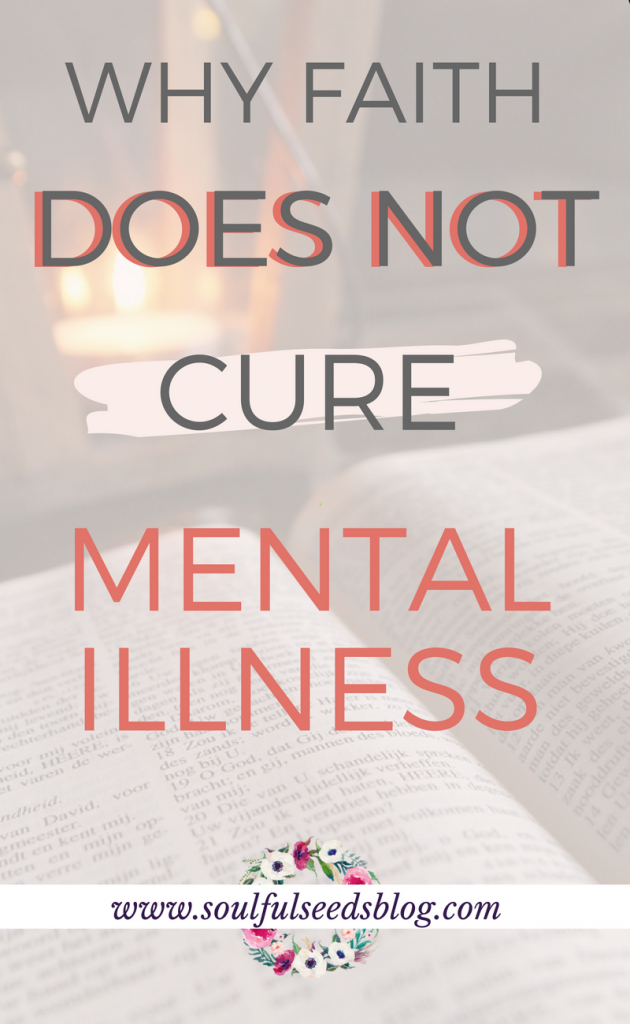(This is a guest post coming from Allie, a faith based wellness blog. A self described free spirit, Allie is passionate about spirituality, creativity, and mental health advocacy. A fellow vegan and faith driven gal, we’re kindred souls! Make sure to check out her blog and subscribe to her newsletter. Ya won’t regret it 🙂

My two passions for spirituality and mental health don’t coincide well. However, I believe they should.
Changing the relationship between religion and mental health is not something that’ll happen overnight. It’s been centuries’ worth of confusion and struggle, using God’s name as a means to rid the world of any internal and external darkness.

There’s still little mention of mental health, especially compared to other life challenges, in faith. Prayer and worship could be very useful for so many people with mental illness, but the stigma and shame keep them away from these places.
This needs to change.
Although God should not be seen as a cure or treatment for mental illness, His love and grace could be a major factor in encouraging people to keep living and find purpose when all else seems lost.
Where we’ve come from.
From the beginnings of religion and mental health, the two forces have clashed. Cue battle scene music.
Mental illness has been long thought of as “madness.” This madness was seen as a curse from God or demons entering the body. Skulls from 5,000 years ago have been found with holes bored into them, presumably to release evil spirits causing madness.
In Christianity specifically, the New Testament has been known to depict madness as the battle between Holy Spirit and Devil vying for souls. This is where witch hunts and exorcisms come into play. Religion then was elemental in creating the foundation that first elicited shame from mental illness, thus exuding a stigma.
This stigma is what left many scared of the mentally ill, treating them as if they are “less than” others. That they should be confined from the rest of society. That Satan has overtaken them. That regular church attendance, pilgrimages, and frequent confessions and repentance of sins is the appropriate action to take.
Personally, I grew up learning that suicide is as sinful as murder. No time have I actually heard “mental health” or “mental illness” spoken by anybody, not a pastor nor a congregation member. It’s as if mental illness doesn’t even exist. This avoidance and fear further perpetuated my own ignorance for many years; time I could have spent gaining awareness of my own struggles was instead shrouded in darkness.
Even now, fully committing myself as a mental health advocate, I’m hesitant to ever mention that within church walls. Suicide and mental illness are still scary demons lurking in the dark. With as prevalent as mental illness is, I know I’m not the only one in my faith community struggling, and yet nobody has wanted to break the silence. This needs to end.
Where we are now.
God’s powers are beyond human understanding. He is constantly present and at work in our lives. That leads many to believe that He alone can be a cure for the incurable, that prayer and worship and Scripture reading are all we need for a healthy life.
We all struggle, and many of these struggles cannot simply be “prayed away.” It’s not just an attack of the enemy, the only necessary response being expulsion—to just cast it out.
God put us in these positions, likely difficult and painful, for a reason. He is not a genie that will magically cure us; instead, He has given us the abilities to reach out and seek resources that will actively help us. Therapy and medication are scientifically proven methods of doing so.
While I wholeheartedly believe in God and all He does, He is not a reason to neglect medical attention.
Rather than soliciting God and religion as the end-all cure for mental illness, faith can be an effective tool to incorporate for those struggling with their mental health.
Research has shown that for some, religion and individual spirituality can directly improve our physical and mental health. Practices like meditation and prayer have been shown to cause a relaxation response: decreased metabolism, decreased heart rate, decreased breathing rate and slower, calmer brain waves.
People can draw on many spiritual resources that include spiritual support from God or a higher power, rituals to facilitate life transitions, spiritual forgiveness, support from a religious institution or clergy, and reframing a stressful situation into a larger, more benevolent system of meaning.
Furthermore, faith can bring people together into communities that will help alleviate social isolation that can come from mental illness. Not all faith settings are created equal: you should feel welcomed and loved and not mental illness is a moral failing for which prayer is the only treatment. Potential discrimination in the church will only keep you quiet and more isolated.
Where we should go.
Faith should be a tool to help people treat themselves well and seek out optimal health in mind, body and soul.
It can become a source of hope when everything else in life feels empty and meaningless. It can bring a greater perspective to suffering beyond one person’s mental battles. It can connect one another and create communities to lean on in difficult times.
In the church setting, mental illness can feel unwelcome. Shameful. Sinful. A source of guilt. A reason to pray or atone more rather than seek professional resources. Mental illness is an unspoken presence for so many, with nobody bold enough to speak up.
If we immediately dismiss the possibility of mental illness and automatically assume spiritual deficiency, our actions amount to spiritual abuse. Our stigma and fear are often disproportionate to the realities of mental health and illness.
God tells us in Isaiah 41:13, “For I am the Lord, your God, who takes hold of your right hand and says to you, Do not fear; I will help you.” We must turn to God for strength and clarity to realize we are all children worthy of love, regardless of our health and circumstances.
Just as we pray for others when they are struggling with physical ailments or family crises, the same courtesy should go for mental illness. The faith community is in an important position for individuals, people whose values and beliefs are directly dependent upon religion.
That means all churchgoers and believers, especially those in leadership positions, should be aware and educated about mental health. They should recognize and dispel the misconceptions that have been drilled into our heads (LITERALLY).
We, the people of God, have an invitation. In Mark 12:31 Jesus tells us to “love your neighbor as yourself.” We shouldn’t fear mental illness because it’s likely closer than you think.
We should accept one another and be open to learning and growing. We should promote awareness and proven resources in treating mental illness. We must equip churches with these resources and methods in place to truly support others.
So no, God is not the single cure for mental illness. He will not restore the correct balance of serotonin in your brain after you’ve prayed long enough. What He can do is uplift our spirits in times of despair.
He can draw us to His Word, encouraging us to seek out wisdom. He can provide us the bravery and perseverance we need to adopt a truly accepting and loving faith community, changing the current stigma and fearful dialogue surrounding mental illness.
Where to find Allie
Love Allie’s musings and beautiful words? Yeah, me too! Support her and stay updated with her work on these different platforms-
![]()
